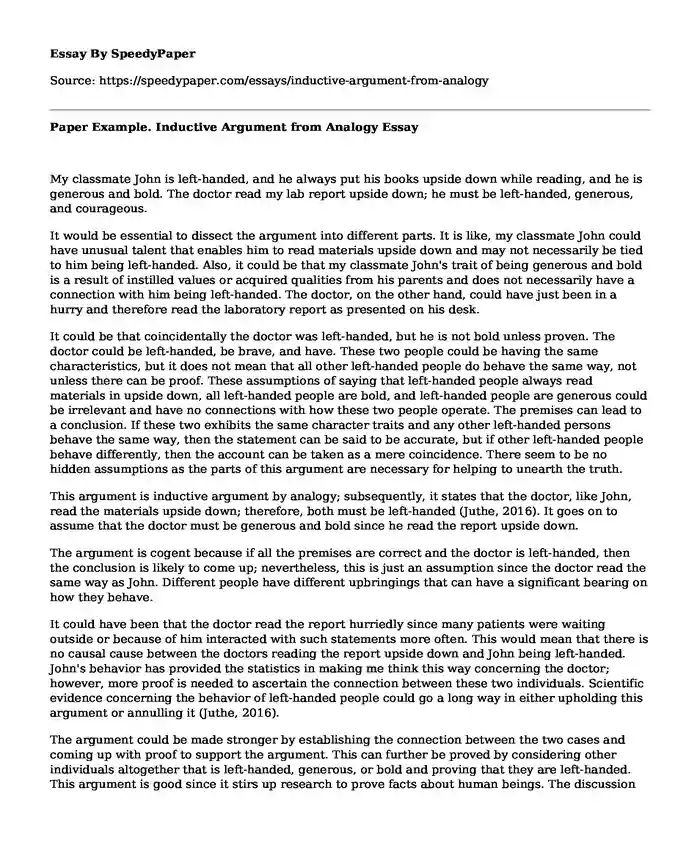
| Type of paper: | Essay |
| Categories: | Psychology Medicine Behavior |
| Pages: | 3 |
| Wordcount: | 643 words |
My classmate John is left-handed, and he always put his books upside down while reading, and he is generous and bold. The doctor read my lab report upside down; he must be left-handed, generous, and courageous.
It would be essential to dissect the argument into different parts. It is like, my classmate John could have unusual talent that enables him to read materials upside down and may not necessarily be tied to him being left-handed. Also, it could be that my classmate John's trait of being generous and bold is a result of instilled values or acquired qualities from his parents and does not necessarily have a connection with him being left-handed. The doctor, on the other hand, could have just been in a hurry and therefore read the laboratory report as presented on his desk.
It could be that coincidentally the doctor was left-handed, but he is not bold unless proven. The doctor could be left-handed, be brave, and have. These two people could be having the same characteristics, but it does not mean that all other left-handed people do behave the same way, not unless there can be proof. These assumptions of saying that left-handed people always read materials in upside down, all left-handed people are bold, and left-handed people are generous could be irrelevant and have no connections with how these two people operate. The premises can lead to a conclusion. If these two exhibits the same character traits and any other left-handed persons behave the same way, then the statement can be said to be accurate, but if other left-handed people behave differently, then the account can be taken as a mere coincidence. There seem to be no hidden assumptions as the parts of this argument are necessary for helping to unearth the truth.
This argument is inductive argument by analogy; subsequently, it states that the doctor, like John, read the materials upside down; therefore, both must be left-handed (Juthe, 2016). It goes on to assume that the doctor must be generous and bold since he read the report upside down.
The argument is cogent because if all the premises are correct and the doctor is left-handed, then the conclusion is likely to come up; nevertheless, this is just an assumption since the doctor read the same way as John. Different people have different upbringings that can have a significant bearing on how they behave.
It could have been that the doctor read the report hurriedly since many patients were waiting outside or because of him interacted with such statements more often. This would mean that there is no causal cause between the doctors reading the report upside down and John being left-handed. John's behavior has provided the statistics in making me think this way concerning the doctor; however, more proof is needed to ascertain the connection between these two individuals. Scientific evidence concerning the behavior of left-handed people could go a long way in either upholding this argument or annulling it (Juthe, 2016).
The argument could be made stronger by establishing the connection between the two cases and coming up with proof to support the argument. This can further be proved by considering other individuals altogether that is left-handed, generous, or bold and proving that they are left-handed. This argument is good since it stirs up research to prove facts about human beings. The discussion helps us to get deeper into the behavioral aspects of individuals and match them to certain character traits (Mitchell, 2016). Sometimes when the research has been done and scientific proofs are brought forward, special materials could be made for special groups.
Works cited
Juthe, André. "Classifications of Arguments by Analogy Part I. A comprehensive review of proposals for classifying arguments by analogy." Cogency 8.2 (2016): 51-99.
http://www.cogency.udp.cl/index.php/cogency/article/view/281
Mitchell, Sandra D. "Anthropomorphism 10 and Cross-Species Modeling." The Animal Ethics Reader (2016): 89.
Cite this page
Paper Example. Inductive Argument from Analogy. (2023, Aug 13). Retrieved from https://speedypaper.com/essays/inductive-argument-from-analogy
Request Removal
If you are the original author of this essay and no longer wish to have it published on the SpeedyPaper website, please click below to request its removal:
- Free Essay about Social Action Plan
- Free Essay with the Teen Depression Case Study
- Free Essay Example on Psychosocial Problems
- Free Essay. Analytical Essay of Lead Female Character of The Movie Hyenas
- Essay Sample on Differences and Similarities Between IRB, IBC, and IACUC.
- Paper Example. Grabbing Maintaining Attention
- Free Paper Example on Evidence Based Practice
Popular categories




